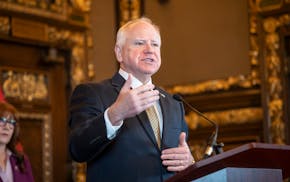Seven employees from Northwest Airlines founded the business that has grown into Wings Credit Union, the largest financial service provider of its kind based in Minnesota, with about 372,000 members.
It's about to get much bigger. The Apple Valley-based Wings announced Wednesday the next chapter in its story through a planned merger with Colorado Springs, Colo.-based Ent Credit Union.
Under a new structure expected to take shape in 2026, the combined business is expected to rank among the nation's largest credit unions, with about 930,000 members and roughly $19.2 billion in managed assets. The merged business will operate under the Wings brand.
The combination comes as the financial services industry is becoming a more competitive landscape where big banks and financial tech corporations compete with credit unions for new clients. Unlike banks, credit unions tend to be not-for-profit organizations in which leadership answers to members rather than shareholders.
Credit unions on average offer competitive rates compared to banks, with lower loan interest and greater savings account yields, according to the National Credit Union Administration (NCUA), which oversees federally insured credit unions.
The credit unions' leaders say the merger will put two businesses of virtually equal footing under the same roof, saying the combination will ultimately enhance the service offerings for members and help weather the challenges small financial institutions face.
Despite being in neighboring markets, Wings and Ent do not have geographic overlap and have complimentary business lines, said Ent CEO Chad Graves. As the merger moves forward, Graves said there will be no need for layoffs or branch closures — and the credit union expects to grow significantly its count of 2,200 employees over the next 10 years.
Along with a shared background in aviation, Graves said Wings and Ent each pride themselves on being organizations that put service first and are informed by local decisionmaking. Although its headquarters will legally be in Colorado, Graves said there will essentially be two headquarters for Wings, as much of its client and employee base is in Minnesota.
"We're really going to make sure that what works well in Minnesota is going to continue to work well ... and same thing in Colorado," Graves said. "We want to make sure that we are really keeping that local connection."
Wings CEO Frank Weidner said the financial forecasts of the combined organization look positive as the two find efficiencies and greater scale.
"We hope that everybody is going to have a role in the organization. It may look a little different than what they have today. But we're going to have a ton of work to do with integration and putting organizations together, and so we're going to need all the help we can," Weidner said.
In the coming months, leaders of Wings and Ent anticipate receiving necessary approvals from members and federal regulators. Graves will take the helm as chief executive of the combined organization.
The total number of credit unions in the U.S. is in decline, a figure driven down through an industrywide consolidation trend. The NCUA in December counted 4,455 across the country. Ten years ago, there were 6,273.
However, credit unions have continued to see membership numbers and managed assets increase over the past decade. Many that initially formed to serve specific industries or companies have also expanded eligibility to welcome more members.
Since 2019, most combinations of credit unions have been larger institutions acquiring much smaller ones, according to Wilary Winn, a financial consultant which tracks credit union industry trends. But strategic mergers of larger, equally sized credit unions have risen over the past few years, said Cole Schulte, a director at the Oakdale, Minn.-based firm.
Still, Schulte said of Wings and Ent: "This is likely one of the largest that we've seen."
Minnesota reached its peak number of credit unions with about 490 in the 1960s and today the state boasts 86, including two newly chartered last year, said Mara Humphrey, president and CEO of the Minnesota Credit Union Network. She noted the first institutions were started by small groups with little seed money.
Now, credit unions are competing to offer the type of on-demand tech features customers have come to expect. Humphrey said she thinks the growth of membership is due to consumers recognizing the value credit unions still offer.
"We do business a lot differently now," she said.
Also a factor being considered by Wings and Ent leaders in the immediate future is added regulatory oversight.
After the Great Recession, the Dodd-Frank Act put in place added consumer protections meant to prevent future failures in the financial sector, including oversight from the Consumer Financial Protection Bureau established in 2011.
Once Wings and Ent combine, the new credit union will fall above a $10 billion threshold that triggers more regulation, Graves said. Meantime, crossing that level also limits the ability to collect interchange fees on card transactions.
"That's why it's so important for us to find scale and to come together," Graves said, as credit unions work to provide technical services customers rely on, prevent them from falling victim to fraud and stand out in a space that is seeing constant innovation.
"We're already doing a great job of providing the services that our members need and expect. But I think it's more looking towards the future," he added. "Five years out, what are the demands that our members might have when you factor in AI and some of these other emerging technologies?"

Delta hiked fares for solo travelers, until Twin Cities travel experts caught the change

In first speech back, UnitedHealth's new CEO pledges to review hot-button issues

A child had measles at Mall of America, concerning state health officials who don't know source

Ramstad: Gov. Walz, things are not getting done in Minnesota

